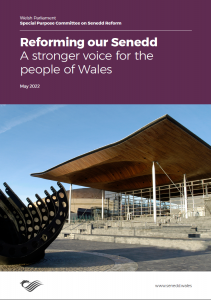CAN WALES BE AN ANTI-RACIST NATION?

On June 7, Welsh Government published its Anti-racist Wales Action Plan. Drawing on Black, Asian and Minority Ethnic communities’ experiences of racism, and race inequality, the Plan sets out a series of actions from across Government to make a real difference to the lives of people. The actions are focused on the next two years, set against the vision of a Wales which is anti-racist in 2030.
The Plan adopts an anti-racist approach which means looking at the ways in which racism is built into our policies, formal and informal rules and regulations, and the way Government works. It focuses on the ways in which racism affects the lives of ethnic minority people, such as their experience of racism in everyday life, service delivery, as part of the workforce and the lack of visible role models in positions of power.
The Goals and Actions in the Plan cover policy areas across government, including, health, culture, homes and places, employability and skills, education as well as a focus on leadership and representation within the Welsh Government and across public services.
Cytûn will study the document in detail. We are glad to see the inclusion – at the request of ourselves and others – of references to anti-religious and religiously based prejudice. This is placed specifically in the context of anti-Semitism and Islamophobia, but there is also a more general commitment to “Ensure the Hate Hurts Wales campaign highlights the harm caused by religious hate and bigotry.” (p. 121).
THE COMPLEXITY OF LEGISLATING FOR WALES IN WALES AND WESTMINSTER
The Queen’s Speech on May 10 2022 followed recent precedent by including a number of pieces of Westminster legislation covering matters usually devolved to the Senedd in Wales. Legislation is also proposed in areas which proved controversial in the previous session of Parliament.
For example, the Procurement Bill will legislate to bring procurement rules across England and Wales, including those related to procurement by Welsh Government and devolved bodies, into line with UK Government procurement policy. This is likely to impede the Welsh Government’s Social Partnership and Public Procurement (Wales) Bill, introduced to the Senedd on June 7. The aim of that Bill is to introduce an ethical element to public procurement in Wales, and ensure that the principles of the Well-Being of Future Generations (Wales) Act are implemented as public money is spent. Public sector procurement will also be affected at Westminster by the Trade (Australia and New Zealand) Bill which implements trade agreements negotiated by the UK Government, and the Boycotts, Divestment and Sanctions Bill which will prevent public authorities, including those devolved to Wales, from restricting procurement from certain countries on ethical grounds.
Cytûn has produced a full briefing on the Queen’s Speech which is available from gethin@cytun.cymru. The Welsh Government will announce its legislative programme for 2022-23 in July and this will be covered in the next edition of the Policy Bulletin.
THE CONSTITUTION OF WALES BACK ON THE AGENDA

One of the least appropriate phrases in the Welsh political lexicon is “devolution settlement”. None of the attempts to amend the Government of Wales Act 1998 (in 2006, 2014 and 2017), or the changes made by post-Brexit legislation such as the United Kingdom Internal Market Act 2020, have “settled” the matter for more than a year or two. Many Westminster laws have to change the devolution settlement in order to work across England and Wales, and the Senedd has had to consider whether to give its consent to all or part of no fewer than 20 Westminster bills since 2021 – with more to come following the 2022 Queen’s Speech (see page 1).
Here we are in 2022, therefore, discussing the constitution again! The Wales Act 2017 devolved to the Senedd the right to legislate on certain internal issues – such as the number of members and the voting system. The Welsh Government and Plaid Cymru have announced plans to reform both by the next Senedd election in 2026 by increasing the number of members to 96 and changing the voting system to a list system – where electors can vote for a party only, and not for individuals, with seats allocated proportionately within each constituency. This is broadly the system used to elect Welsh MEPs until the final election in May 2019, before the United Kingdom left the European Union in 2020.
The main arguments in favour of these changes are that more Senedd members are needed to ensure adequate scrutiny of the work of Welsh Government and of proposed legislation without overloading backbenchers with committee work. The list-only voting system also allows quotas to be put in place to strike a balance between men and women in Parliament – a result that could never be guaranteed if electors were allowed to choose between individual candidates.
The Welsh Conservatives and Welsh Liberal Democrats do not like the proposals, but they have been approved by a majority by Labour and Plaid Cymru members on the Special Purpose Committee of the Senedd. A useful summary of that committee’s recommendations can be found on the Senedd website. Cytûn would welcome hearing from our member churches and organisations about their response to these recommendations – contact gethin@cytun.cymru

The intention is to legislate to “settle” this issue in good time by 2026. But there are other questions that cannot be resolved so quickly, and an Independent Commission on the Constitutional Future of Wales has been set up to address the long-term future of the constitution. The co-chairs of the Commission are Bishop Rowan Williams (former Archbishop of Wales of the Church in Wales and Archbishop of Canterbury) and Professor Laura McAllister. Until the end of July, the Commission is holding a Have Your Say public consultation, which encourages individuals and organisations to send their ideas for the future to them. Although there is no set response format, the Commission has suggested a series of questions for consideration:
1. What matters to you about the way Wales is run?
2. What do you think the priorities for the commission should be?
3. Thinking about how Wales is governed, by the Welsh Government and the UK government, what are the strengths of the current system, what aspects do you most value and wish to protect? Can you provide examples?
4. Are there any problems with the current system, and if so, how could they be addressed? Again, please provide examples.
5. Thinking about the UK government, the Welsh Government and Welsh local government (your local council), what do you think about the balance of power and responsibility between these three types of government – is it about right or should it change and if so, how? For example, who should have more power, or less?
6. As a distinct country and political unit, how should Wales be governed in the future? Should we:
- broadly keep the current arrangements where Wales is governed as part of the UK, and the Westminster Parliament delegates some responsibilities to the Senedd and Welsh Government, with those responsibilities adjusted as in Q5, OR
- move towards Wales having more autonomy to decide for itself within a more federal UK, with most matters decided by the Senedd and Welsh Government, and the Westminster Parliament decides UK-wide matters on behalf of Wales (and other parts of the UK) OR
- move towards Wales having full control to govern itself and be independent from the UK OR
- pursue any other governance model you would like to suggest
- alongside any of these options, should more responsibilities be given to local councils bringing decision making closer to people across Wales and if so, please provide examples.
7. Overall, what is most important to you in about the way in which Wales should be governed in the future? Is there anything else you want to tell us?
Cytûn would like to know if our members would wish us to prepare a response, and if so what we should say. You can contact gethin@cytun.cymru to offer suggestions – and meanwhile you can send in your own response via the Have your say website.
LIVING WITH COVID AND INQUIRING INTO ITS HANDLING
The final Covid public health regulations in Wales expired on May 30. As a result, the legal situation for places of worship and for events organised by churches has returned to that which prevailed prior to March 2020. This means that the responsibilities of those who are trustees or managers of places of worship and community centres, and those who organise public events including worship, will revert to the previous Health and Safety, Safeguarding and other requirements. Risk assessments made under this legislation will, however, need to include an assessment of the risks associated with Covid along with risks associated with the transmission of other infectious diseases.
Cytûn continues to publish a briefing paper on our website, updated as need arises. The page is now mainly about the legal and moral implications of ‘living with Covid’ in the future. While the legal situation is one with which churches should be familiar, we know that attitudes to risk have changed amongst church members and society at large, and we will continue to offer general information on our website for the foreseeable future. Unfortunately, Cytûn is not funded to a sufficient level to enable us to seek specialist advice on Health & Safety, Safeguarding, and so on, and as Cytûn itself does not own or manage places of worship we have no standing to seek bespoke legal advice – which, in any case, will vary from denomination to denomination depending on their different legal structures and church order.

Cytûn, Churches together in Britain and Ireland and a few individual denominations contributed to a consultation on the terms of reference for the UK Covid-19 Inquiry. Our input has borne fruit, and specific references to the closure and re-opening of places of worship, the role of the voluntary sector, and the engagement between the devolved and UK governments have now been included in the terms of reference recommended by Baroness Hallett to the Prime Minister. The Welsh Government remains clear that they will not set up a Wales-specific inquiry, so participating in the UK inquiry will be essential for the churches and people of Wales. We will continue to liaise with the investigation team and Covid-19 Bereaved Families for Justice Cymru about ensuring that our contribution is given due consideration.
CALLING ALL CHURCH YOUTH WORK SERVICES IN WALES!
A new and exciting project to map and evaluate the voluntary Youth Work sector in Wales has been launched. The KESS project – Mapping and Evaluating the Voluntary Youth Work Sector for Wales is a Masters by Research project conducted by the University of South Wales and funded by the European Social Fund in partnership with CWVYS (the Council for Wales of Voluntary Youth Services). The research aims to make the voluntary youth work sector more visible and ensure their contributions are valued by all stakeholders.
You may be aware that the voluntary sector is under-researched and valued in comparison to statutory services, who have an audit each year. We hope our research can change this. Cytûn was involved in the early stages of setting up this project, and we warmly recommend that the youth services of our member churches should take part.
To do so, participation is sought in a short online survey. If you are an organisation that provides voluntary youth work services for young people in Wales, please follow the link below to the survey which simply captures the nature of your organisation and the support provided to young people. Survey completion should take no more than 15 minutes. Your time and comments are greatly valued.
To start the survey, please follow the below links:
Survey in English: https://southwales.onlinesurveys.ac.uk/mapping-and-evaluating-the-voluntary-youth-work-sector-for-7
Survey in Welsh: https://southwales.onlinesurveys.ac.uk/mapio-a-gwerthuso-sector-gwaith-ieuenctid-gwirfoddol-cymru
Please also share the survey link and information among your networks (e.g. by email to regional or partner youth officers, or on social media) – the more responses we receive the better we can represent the experiences of the sector as a whole and the young people they support.
You will find further information on the project at the beginning of the survey. Should you have any questions or feedback on the research, please feel free to contact the researcher by email: Elizabeth.bacon@southwales.ac.uk




HOMES FOR UKRAINE … AND OTHER COUNTRIES
Wales, at the behest of the churches and many others, aims to be a Nation of Sanctuary. It is no surprise, therefore, that a large number of local churches and individual members have offered Ukrainian refugees homes through the UK Government scheme. The Welsh Government acts as the ‘super sponsor’ for refugees coming to Wales, and the Welsh Government has published detailed information on how the two governments’ schemes link together. Those who want to understand more about these schemes are advised to turn to that page in the first instance.
Housing Justice Cymru’s (Cytûn member) accommodation scheme for refugees from countries other than Ukraine who are unable to access public support also offers an opportunity to help. Further details and registration can be found at https://housingjustice.org.uk/wales/hosting
The Welsh Government’s Sanctuary website offers refugees themselves guidance on securing their rights in Wales.
CHURCH PROPERTY – CHAPELS, CHURCHES AND HOUSES


It is a busy time for those responsible for church property in Wales. The current issues are summarised here. Detailed briefings are provided to denominational property officers as the need arises. Anyone who wishes to receive these should contact Gethin Rhys at gethin@cytun.cymru
• In responding to an hour-long debate in the Senedd on March 23 2022 about the future of religious buildings in Wales, the Deputy Minister for Arts and Sport in the Welsh Government, Dawn Bowden MS, announced her intention to review the current Strategic Action Plan for Historic Places of Worship in Wales. This review will be led by CADW and the Welsh Historic Places of Worship Forum, on which Cytûn and many member denominations are represented, along with Addoldai Cymru, the National Churches Trust, the Royal Commission on the Ancient and Historical Monuments of Wales and other interested parties. The exact form of the review is currently under discussion, and Cytûn will publicise all opportunities for involvement in this important public discussion.
• In the Queen’s Speech in May 2022 (see also p. 1), the UK Government announced its intention to introduce a draft Protect Duty Bill, to impose duties on the owners of buildings open to the public to take steps to keep the building’s users safe from terrorist attacks. Cytûn, the Churches’ Legislation Advisory Service (CLAS) and a number of denominations responded to a consultation, expressing concern at the potential legal burdens that might be imposed, especially on those who manage buildings occupied by small congregations which seem unlikely to be terrorist targets. Cytûn is working with the Home Office, its Faith Security Training Group, and member churches to ensure that the voice of churches in Wales is heard.
• The next round of the Places of Worship (POW): Protective Security Funding Scheme for England & Wales opened on 19 May and closes for applications on 14 July. It covers the costs of equipment and installation of all security measures, and maintenance costs for one year from the installation date.
• Welsh Government has recently announced a delay in implementing the Renting Homes (Wales) Act 2016 until December 1 this year. The briefing paper on our website has been updated accordingly, and to note that the English (but not the Welsh) text of the Act on legislation.gov.uk has now been updated. This legislation applies to nearly all residential property in Wales occupied by someone other than the owner – not only paying tenants, but also those who occupy housing related to their work. Many of our denominations have received legal advice on the implications of the Act for the housing of clergy in church property; that advice has varied from denomination to denomination. It is for each denomination or appropriate trustee body to seek and implement legal advice relevant to its position.
• Cytûn has received correspondence from the Welsh Government confirming that clergy and church workers living in church property, with the church (rather than the minister) responsible for paying Council Tax, are not eligible for the Welsh Government’s Cost of Living Support Scheme, even if they are responsible for paying the property’s energy bills. The Government suggests that clergy in that situation should apply to the Discretionary Cost of Living Support Scheme administered by their local authority.
RESUMING CYTÛN EVENTS FOR SUMMER 2022

As we can now meet face-to-face as well as online, Cytûn has restarted our program of events. All Bulletin readers are welcome to join us.
A visit to the Senedd has been arranged on the afternoon of Monday June 27 at 1.45 for 2pm. The main purpose of this visit is to fulfil our promise to participants of the Welcome to Wales course in 2020 and 2021 (conducted online) to visit the Senedd, but there are still a few places available. A tour of the building will be led by one of the Senedd’s guides and Gethin Rhys, and will take approximately 45 minutes. There will then be an opportunity for those who wish to come to the café, buy refreshments and continue the conversation there. The tour is free, but please register by no later than June 20 by contacting gethin@cytun.cymru
On Thursday June 30 at 10am an online meeting will be held for national and regional officers to discuss environmental issues and churches. Delyth Higgins, the new Wales officer for the EcoChurch scheme, and Julia Edwards, the Climate Change Champion for the Church in Wales, will talk about their work, and there will be an opportunity to share experiences across Welsh denominations and make connections for the future. You can get the link for the meeting by emailing gethin@cytun.cymru (Please note this is not an opportunity to provide bespoke advice to specific local congregations – opportunities for that purpose are arranged separately by EcoChurch, the Church in Wales and other denominations).
Following a successful and popular week at the Urdd National Eisteddfod in Denbigh (pictured right), the churches’ marquee will be traveling to the Royal Welsh Show, Builth Wells on July 18-21 and the National Eisteddfod of Wales, Tregaron on July 30 – August 6. In both festivals, as it is three years since we last met, the emphasis of the tent will be on reconnecting churches and Christian organisations with one another across Wales and beyond. Visitors of all backgrounds are welcome, with light refreshments available throughout the day, exhibitions by our member organizations, children’s activities, and a book and resource stand. Short services are held daily at 11am (with the National Eisteddfod service on the main stage at 9am on Sunday July 31) and there will be a few other events in the marquee. You will need to pay to come onto the field, but there is no extra charge for activities in the churches tent.
CONTACTING CYTÛN’S POLICY OFFICER
Parch./Revd Gethin Rhys – Swyddog Polisi/Policy Officer
Cytûn – Eglwysi ynghyd yng Nghymru/Churches together in Wales
Registered office: Room 3.3, Hastings House, Fitzalan Court, Cardiff CF24 0BL
Mobile: 07889 858062
E-mail: gethin@cytun.cymru www.cytun.co.uk @CytunNew
Hapus i gyfathrebu yn Gymraeg ac yn Saesneg.
Happy to communicate in Welsh and English
Cytûn is a registered company in England and Wales | Number: 05853982 | Registered name: “Cytûn: Eglwysi Ynghyd yng Nghymru/Churches Together in Wales Limited” | Cytûn is a registered charity | Number: 1117071
Publication date: 7 June 2022. The next Bulletin will be published on July 27 2022.
